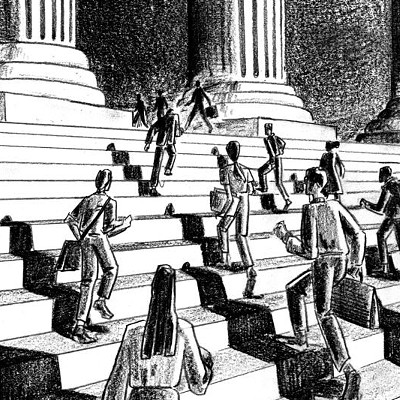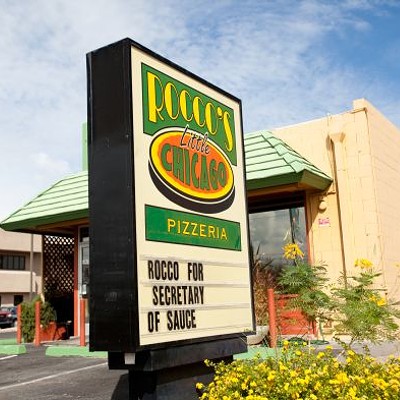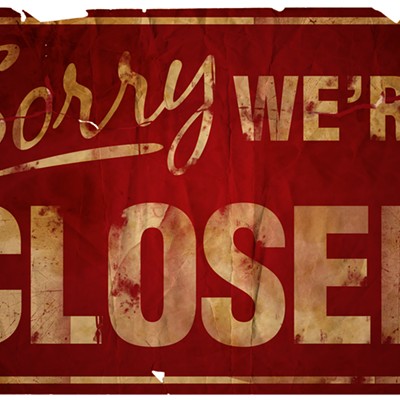"I challenge anyone in the room to say it would be inconvenient for them to get alcohol within that intersection," Jane Evans told the City Council in October. Evans was speaking in opposition to a liquor license for the station, arguing that an alcohol-selling CVS pharmacy was a few hundred feet away; a Fry's sat on the west side of First Avenue; and another gas station directly across Grant Road also sold beer.
Mobil station spokesman Rodney Herbert countered that his retail business had fallen off 23 percent since his previously issued interim license had expired, and his gas sales were down 11 percent.
Herbert's attorney, Thomas Aguilera, pointed out that only three years ago, the City Council had approved a license for this location, and "there were less than nine Series 10s (beer-and-wine store licenses) in the mile radius."
Siding with Evans, the council unanimously recommended denial of the application. This case joined six others--from the dozens of 2006 liquor license requests the council reviewed--that the City Council suggested be turned down.
But after hearing both sides of the argument--and from two customers of the station who stated it was convenient for them to buy beer there--the Arizona State Liquor Board nonetheless approved the Mobil license. This OK--along with the board's approval of two other applications last year that the Tucson City Council had recommended be denied--has Evans and other neighborhood activists upset.
"The council knows if another liquor license is needed in an area," suggests Lupe Rodriguez, of the Fairgrounds Neighborhood Association, around Ajo Way and Sixth Avenue.
Southside resident Pat Martin agrees: "The board should follow the council's decision, since (councilmembers) know what the issues are. Who else knows (better) what the problems are?"
Liquor Board Chairman Jim Ledbetter replies that state law established his group to make the final decision, and that he believes some communities in Arizona would be dry if their councils had the ultimate say.
Aguilera, the Mobil store's attorney, says that if the City Council's vote were always followed, "Then there would be no need for the board. ... There would be no checks and balances. The current process is good."
Aguilera is complimentary of the role that neighborhood protestors and the City Council play in the decision-making process--but he also alleges that City Hall has a "neo-prohibitionist attitude" and is "anti-business" toward his liquor-license clients.
Rodriguez recommends that to be fair to working people who want to personally protest applications, the Liquor Board should hold some of its meetings in Tucson. Alternatively, she says, video-conferencing could be established.
Ledbetter says the idea of rotating the meeting sites around the state will soon be discussed by the board. As for video-conferencing, he calls it "a great idea."
Evans, Rodriguez and Martin--the community activists--all criticize the board for its handling of application hearings. In the Grant Road case, Evans says, it appeared that the board majority had their minds made up before the meeting.
Martin adds: "Neighborhood protestors aren't treated with as much respect as business people."
Refuting that charge, Ledbetter--a four-year veteran of the governor-appointed board--indicates he hears complaints from both sides, leading him to believe the board is acting fairly. As for Evans' specific comment: "That just isn't accurate. There's no communication (amongst the board members) before a meeting."
By far, the biggest objection from local neighborhood representatives is that the Liquor Board doesn't sufficiently factor into its decision the existing number of licenses in an area. Evans says her square-mile Keeling Neighborhood has 23 licenses, about a dozen of which are for packaged liquor sales. Calling 23 an adequate number, she told the City Council in October that there was a high rate of domestic violence in her area, "and alcohol had been proven to be part of the domestic violence problem."
Statistics from the Tucson Police Department indicate that last year, 155 domestic-violence calls were made from the Keeling Neighborhood, which is situated across First Avenue from the Mobil station.
Aguilera admits that he has turned down some potential clients because he felt liquor-license saturation existed in a specific area, but he argues that the saturation level must be defined on a case-by-case basis. He also agrees with Ledbetter that it is the type of license applied for--not the total number of licenses--that must be used to determine saturation.
In the Mobil case, Aguilera suggested to the City Council that customer convenience would be served by approving the request, since there were only two places on the north side of Grant Road between Craycroft Road and Interstate 10 where a motorist could stop to fill up and buy beer at the same time.
Before her motion to recommend denial of this license, Councilwoman Karin Uhlich stated she did not believe "the inconvenience of making a left-hand turn outweighed the interest of trying to reduce domestic violence in the area."
The State Liquor Board didn't agree; Ledbetter says that in general, "some board members frequently take accessibility (to a location) into account."
So today, four cooler cases of beer stand ready to serve customers at the Grant Road Mobil.












